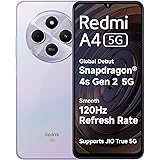Redmi A4 5G (Sparkle Purple, 4GB RAM, 64GB Storage) | Global Debut SD 4s Gen 2 | Segment Largest 6.88in 120Hz | 50MP Dual Camera | 18W Fast Charging
₹8,299.00 (as of April 3, 2025 21:17 GMT +05:30 - More infoProduct prices and availability are accurate as of the date/time indicated and are subject to change. Any price and availability information displayed on [relevant Amazon Site(s), as applicable] at the time of purchase will apply to the purchase of this product.)Travelling abroad is an exciting experience, but one aspect that can be confusing is currency exchange. Whether heading on a business trip, vacation, or planning an extended stay, understanding how to manage your exchange is essential for a smooth and hassle-free experience. This article provides essential tips for abroad currency when travelling abroad, helping you easily explore the process and avoid unnecessary fees and complications. With these tips, you'll ensure your money is efficiently managed and accessible wherever you go.
Understanding Currency Exchange: What You Need to Know
Before embarking on your journey abroad, it’s important to understand the basic concept of exchange and how it works. The exchange involves converting your home country's currency into the local currency of the country you're visiting.
Know the Exchange Rate
The exchange rate significantly determines how much abroad currency you’ll get in exchange for your home currency. Exchange rates fluctuate based on various factors, including economic conditions, political stability, and market demand. It is crucial to monitor the exchange rate before you travel and understand how it impacts your budget.
You can check online tools or apps that provide real-time exchange rate information for a better deal. Be cautious of exchange rate fluctuations during your travels, as they may affect the value of your money and the amount you receive when converting currency. Always plan and ensure you’re prepared to manage fluctuations in currency values.
Compare Exchange Options
There are various ways to exchange currency when travelling abroad, and not all options offer the same rates or fees. Comparing exchange options and assessing their benefits is helpful before deciding on the best option.
One of the most common options is using local exchange kiosks at airports or tourist areas. However, these may offer lower exchange rates and fees than other methods. Bank exchanges and local exchange bureaus often provide better rates, but they may require more effort and planning in advance.
Using ATMs abroad is another popular method for withdrawing local currency, as many banks offer competitive rates. However, be aware of potential foreign transaction fees or ATM withdrawal charges that may apply. It's a good idea to check with your bank about their fees for international ATM withdrawals before your trip.
Currency Exchange Tips: How to Get the Best Deal
Consider the following currency exchange tips to ensure you get the best value for your money. Being proactive and prepared can save money and avoid unnecessary stress when managing foreign currency.
1. Exchange Currency in Advance
One of the most effective ways to secure a good exchange rate is to exchange your currency before leaving for your trip. Many banks, post offices, and online exchange platforms offer competitive rates for foreign currency. You can avoid the premium fees charged at airport exchange booths or touristy areas by exchanging currency in advance. Additionally, exchanging currency early allows you to lock in a rate, giving you certainty about the amount of foreign currency you’ll receive.
2. Avoid Airport Exchange Kiosks
While airport exchange kiosks are convenient, they often provide the worst exchange rates and charge high fees. Airport exchange services are typically designed for last-minute transactions, so they come with a price. If possible, plan and exchange some currency before your flight. Alternatively, use ATMs abroad for a better rate, but be mindful of ATM fees.
3. Use Credit and Debit Cards Wisely
Using your credit or debit card abroad can be a convenient and cost-effective purchase method. Many credit cards offer competitive exchange rates without the need for cash exchange. However, before using your card, you must check whether your issuer charges foreign transaction fees, which can add up quickly.
When using your card abroad, try to opt for payments in the local currency rather than your home currency. Some merchants may offer to convert the amount into your home currency, but this typically comes with an unfavourable exchange rate. Pay in the local currency to avoid additional fees.
4. Carry a Small Amount of Local Currency
While credit and debit cards are widely accepted in many countries, carrying a small amount of local currency with you is still a good idea. This is especially important for smaller towns, rural areas, or places where card payments are less common, such as local markets or remote destinations. Cash on hand will give you peace of mind and flexibility when dealing with small purchases or unexpected expenses.
5. Consider Currency Exchange Services at Home
If you know you’ll need a substantial amount of foreign currency, you may want to consider using exchange services in your home country. Many banks and exchange services allow you to order foreign currency online or in person before you travel. This can save you time and often provides better rates than waiting until you arrive at your destination.
6. Research Local Currency Regulations
Countries have different regulations regarding exchange, particularly regarding limits on how much currency you can bring into or take out of the country. Before travelling, research the local rules to ensure you’re not violating any regulations. Being aware of these rules will help you avoid issues at customs and ensure that your travel funds are managed effectively.
7. Avoid Exchanging Currency at Tourist Hotspots
Tourist hotspots and popular destinations tend to have exchange booths with inflated rates. While they may seem convenient, these locations often charge high fees for exchange services. To get the best deal, seek out local exchange bureaus away from tourist areas or use ATMs in well-populated, secure locations.
Master Currency Exchange for Stress-Free Travel
Managing exchange when traveling abroad doesn’t have to be complicated or costly. You can save money and avoid unnecessary fees by understanding the basics of exchange rates, comparing your options, and following practical currency exchange tips. Whether you’re planning a short getaway or a long-term stay, a little preparation can ensure you have the right amount of local currency for your needs without overpaying.
An essential part of this preparation is safeguarding your finances and health while travelling. A comprehensive international travel insurance plan, like the ones offered by Niva Bupa Health Insurance, protects you against unexpected medical expenses and provides added peace of mind in case of travel-related disruptions. With Niva Bupa’s tailored plans, you can focus on your journey's excitement, confident that your finances and well-being are well-protected.







0 Comments